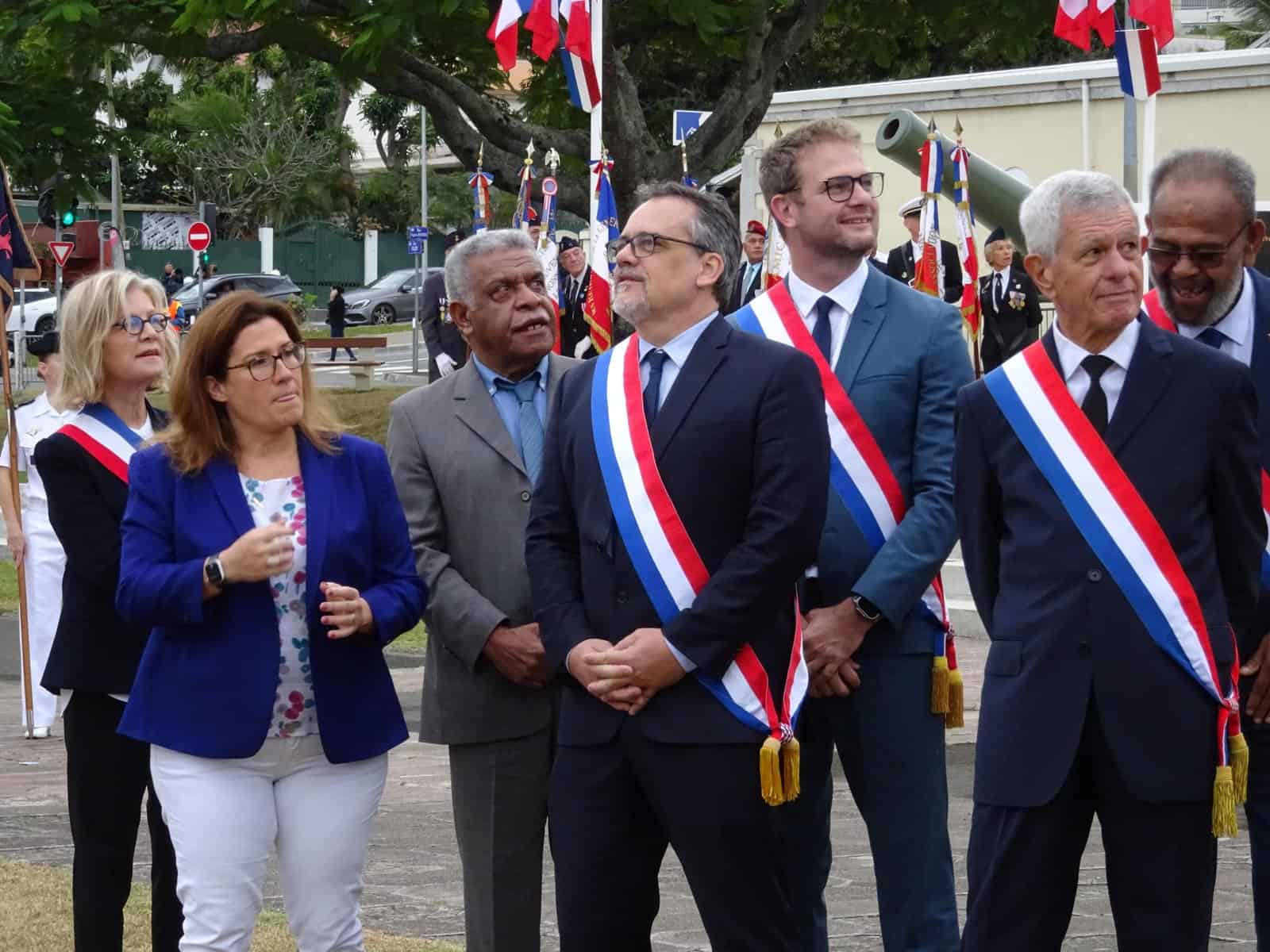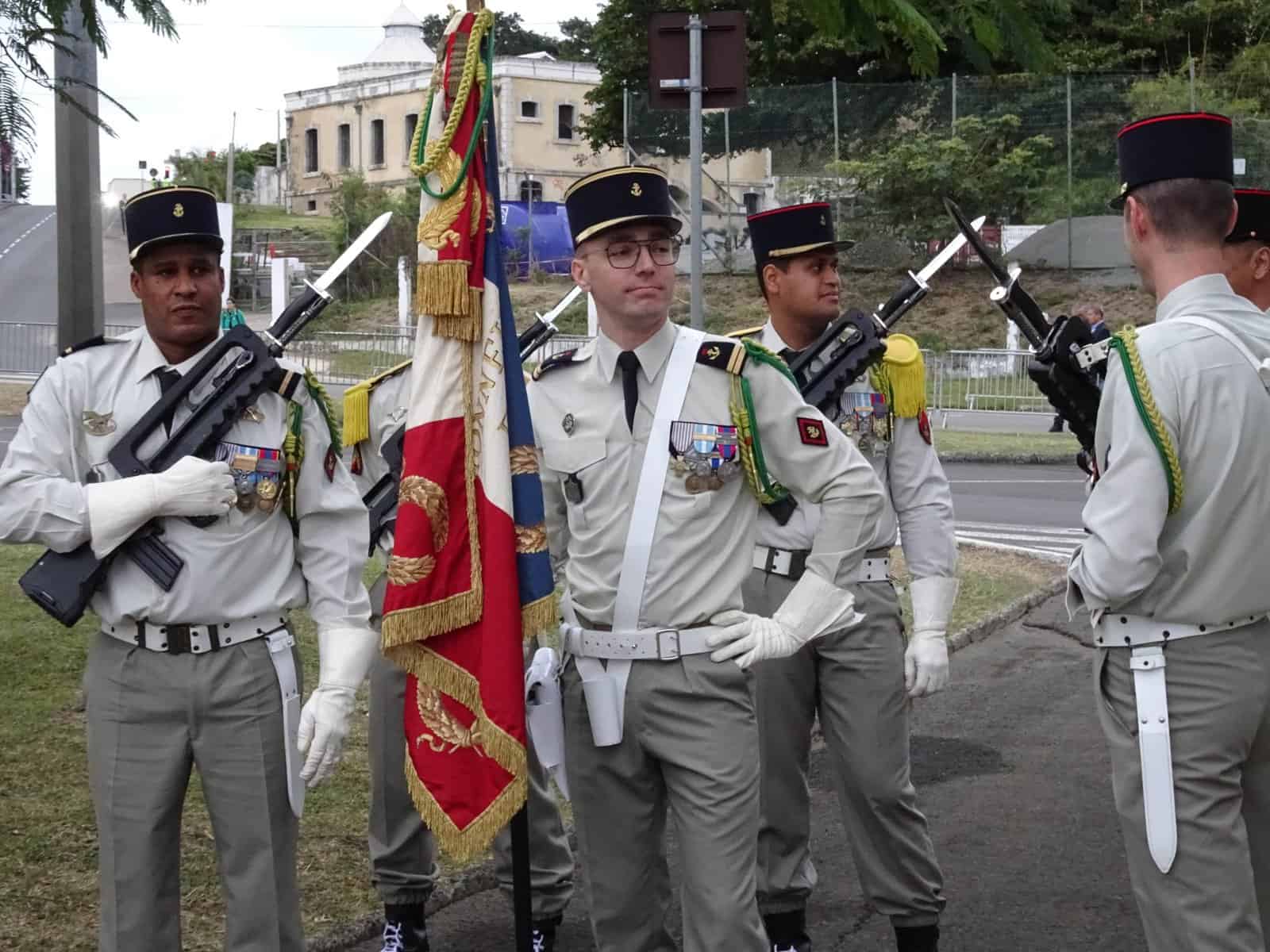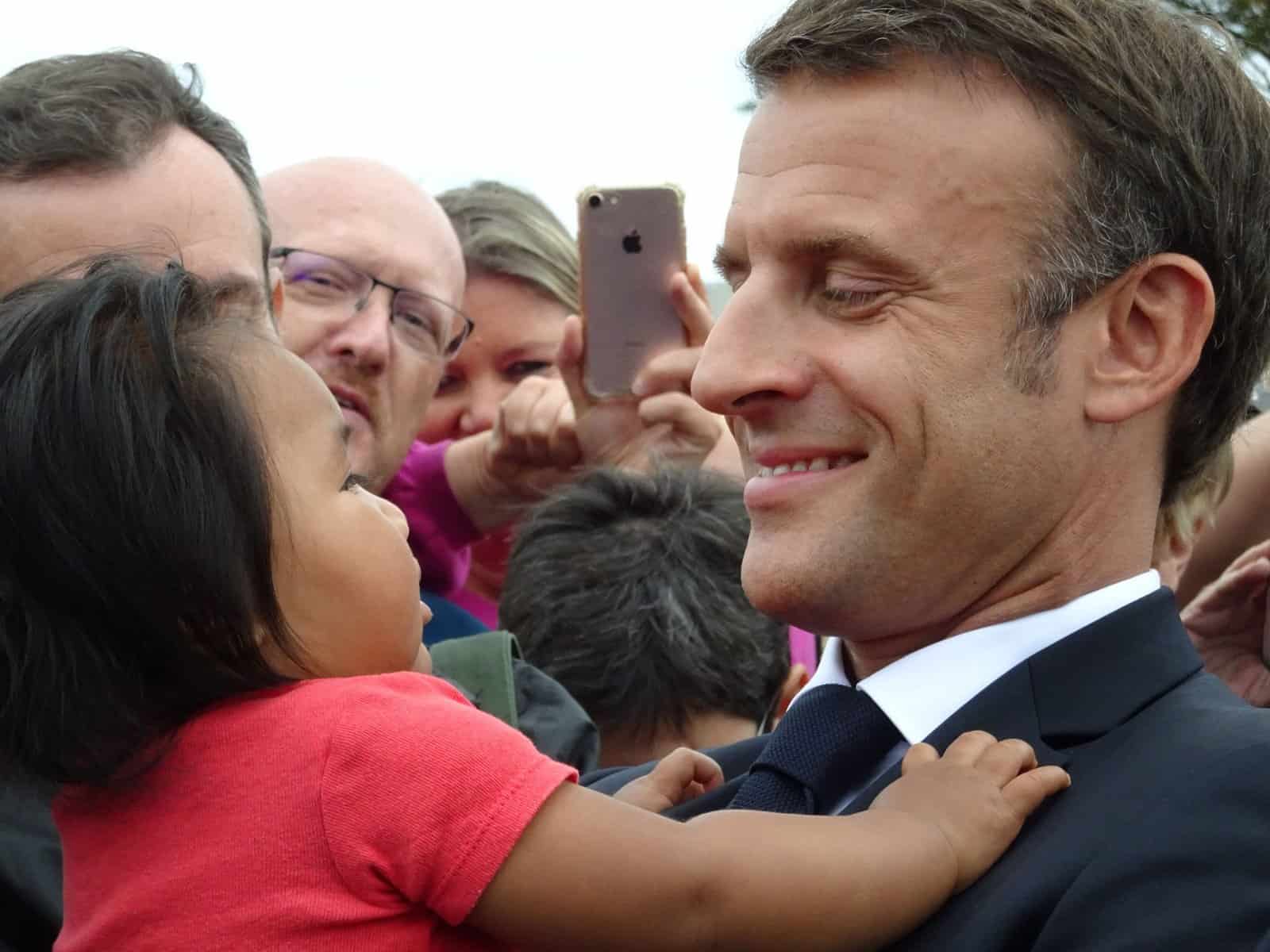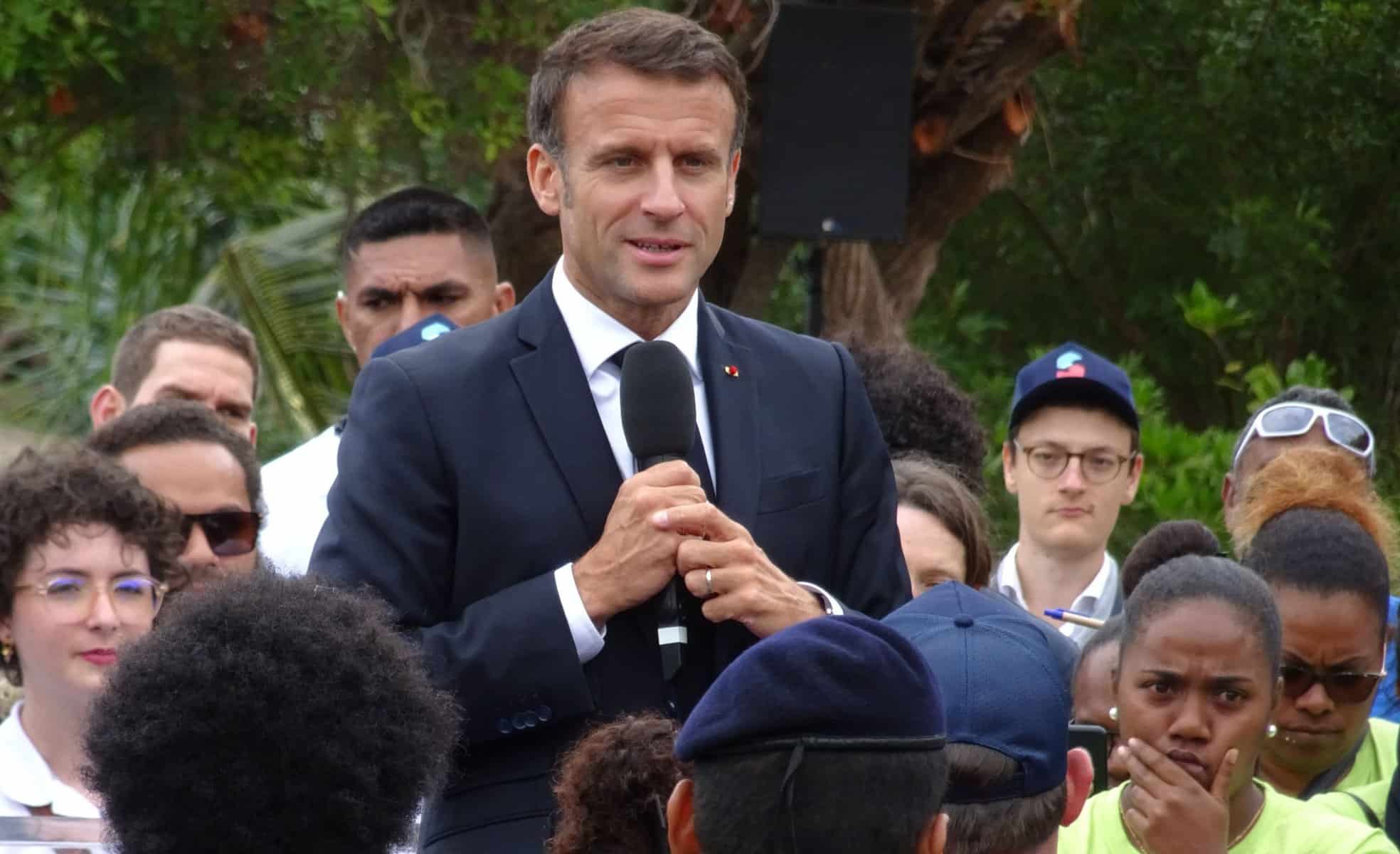French President Emmanuel Macron has begun his five-day visit to New Caledonia, Vanuatu and Papua New Guinea, outlining his “economic, environmental and geopolitical program.”
Arriving at Tontouta airport in New Caledonia on Monday night, President Macron’s visit is designed as a series of photo opportunities to highlight France’s role as an Indo-Pacific power. He also seeks to rebuild trust with independence leaders, shattered by France’s decision to rush through a third referendum on self-determination in December 2021, when most supporters of independence refused to participate.
Seeking to move beyond current political stasis, Macron said that it was important to “open a new page,” creating a new political statute for New Caledonia after the three referendums where “the choice that was made was to remain within the Republic.”
Accompanying Macron were a bevy of ministers, including Foreign Minister Catherine Colonna, Overseas and Interior Minister Gerald Darmanin, Armed Forces Minister Sébastien Lecornu and Citizenship Minister Sonia Backes (the leader of New Caledonia’s anti-independence Loyalist coalition, who is the President of New Caledonia’s Southern Province, and serves in the government in Paris).
As the French President heads to Vanuatu on Thursday and Papua New Guinea in Friday, Colonna will travel to Suva on 25 July, in the first ever visit by a French Foreign Minister to Fiji. In Vanuatu, Macron will be accompanied by President Louis Mapou of New Caledonia and President Moetai Brotherson of French Polynesia – for the first time, the two largest French Pacific dependencies are both led by pro-independence politicians, a sign of the challenge facing ongoing French colonial rule.
Indo-Pacific role

A central feature of Macron’s tour is to reaffirm France’s claim to be a Pacific power, based on its colonial control in three Pacific dependencies. In recent meetings with Chinese and Indian leaders, Macron has also stressed that France can act as a “balancing force” in the Indo-Pacific region, at a time of growing US-China tensions.
Even before touching down in Noumea on Monday night, Macron tweeted a photo of his presidential aircraft shadowed by two Rafale jet fighters of the French air force: “Flying towards New Caledonia, welcomed by our Rafales which confirm that France is a power in the Indo-Pacific!”
The Rafale are part of a larger group of French military aircraft deployed to the region under Operation Pegasus 2023. Aligning with the AUKUS anti-China partnership, the aircraft are participating in exercises with the US Indo-Pacific Command and joining the Talisman Sabre wargames underway in Australia.
In another ‘Top Gun’ display, the two Rafale conducted an overflight of his first event on Tuesday morning – a military ceremony at Place Bir Hakeim in Noumea. The French leader laid a wreath on the Monument aux Morts war memorial, after reviewing contingents of soldiers from the Forces Armées de la Nouvelle-Calédonie (FANC).
Later in the day, he announced an extra 150 million euros in financial support for FANC, as well as 200 extra troops to add to the 1,600 French military forces already deployed in New Caledonia, “who have shown the importance of this territory for our projection in the Indo-Pacific.”

Focus on New Caledonia
Throughout the day, Macron conducted a series of tightly managed events, to highlight key issues of his regional agenda.
At every event, as well as greeting assembled diplomats, dignitaries or government representatives, he pressed the flesh with small but supportive crowds. As a politician seeking to burnish his public standing – battered by recent rioting, strikes and protests in France – he stopped for selfies in the crowd, seized every available baby, and chatted to supporters young and old.
A key feature of the day was attempts to acknowledge Kanak custom and identity. Soon after touching down in Noumea, Macron presented the Legion d’honneur to Marie-Claude Tjibaou during a ceremony at the French High Commission. Tjibaou – widow of the assassinated independence leader Jean-Marie Tjibaou – is a leading civil society and women’s rights activist.
On Tuesday, President Macron joined a cultural ceremony at the Senat coutumier (the Kanak customary senate that serves as an advisory body to the New Caledonia government and Congress). After that, it was on to the Tjibaou Cultural Centre, where he briefly addressed hundreds of young people drawn from community groups, volunteer programs and the French Army’s SMA training program.
“The challenge for us is to help you find a career that will allow you to build the future,” he said. “Each young person must find their place, to allow you to build your future project.”
After that, a flying visit to the Northern Province, to highlight the challenge of climate change, sea level rise and agricultural production. At Tiouandé tribe near the east coast town of Touho, he was welcomed by villagers concerned with the erosion of local coastlines.

Independence protests
The ongoing tensions over New Caledonia’s contested political status still underlie the tour of New Caledonia.
As he was welcomed with a customary dance at Tiouandé, sharp eyed observers noted the dancers had “Knky” daubed on their backs – shorthand for Kanaky, the name for New Caledonia used by members of the Front de Liberation Nationale Kanak et Socialiste (FLNKS) and other independence supporters.
Independence activists organised a small protest rally when President Macron visited Touho, and leaders of eight local Union Calédonienne committees in the Northern Province issued a statement criticising his visit: “President Macron is not welcome in our country because of his bias in favour of the radical fringe of local anti-independence parties to sabotage the end of the Noumea Accord.”
Members of the USTKE trade union confederation displayed banners and Kanaky flags in central Noumea, calling for protection of current residency rules that define New Caledonian citizenship (which also govern who can vote for the three provincial assemblies and national Congress). USTKE members and grassroots activists from the southern Drubea-Kapume region, which includes the capital Noumea, have called for “peaceful but determined” protests when the President speaks at a public rally in Noumea’s central square on Wednesday.
On Wednesday morning, Macron will hold a two-hour meeting with political leaders, likely to map out his vision for a new political compact for New Caledonia within the French Republic.
The French government wants to begin trilateral negotiations in Paris in late August, involving both supporters and opponents of independence, to agree on a new political statute to replace the 1998 Noumea Accord. Throughout his visit, Macron has stressed that New Caledonians need “the courage to look to the future,” but there are still many obstacles to a quick agreement.
In a letter to the President from the FLNKS Political Bureau on 20 July, independence leaders reaffirmed their longstanding call for a transition to an independent and sovereign state, noting that “France is once again failing in its duties. It prioritises, at every crucial moment of our history, its own short-term interests as a ‘great power’ in the Pacific. For these reasons, the FLNKS, as a movement for liberation, has challenged and continues to challenge the conduct of the third referendum and its results.”
The letter calls for “the achievement of independence negotiated bilaterally with the administering power, the continuation of the irreversible process of decolonisation of New Caledonia, obtaining a final process that implements a program of accession to full sovereignty and independence, and a constitutional guarantee of the political agreement and the status of accession to independence which integrates a transition phase, an act of sovereignty and the proclamation of birth of a new state.”
It argues that “your responsibility was – and remains – to guarantee an irreversible and sincere process, allowing New Caledonia to meet its desire to be a sovereign state, like other states of the Pacific region.”
As his final event before leaving New Caledonia, Macron is planning a major speech in the Place des Cocotiers – the capital’s main square – outlining his vision for the future. With rain bucketing down on Tuesday afternoon, organisers may be worried that more rain on Wednesday might disrupt his carefully stage-managed parade.
